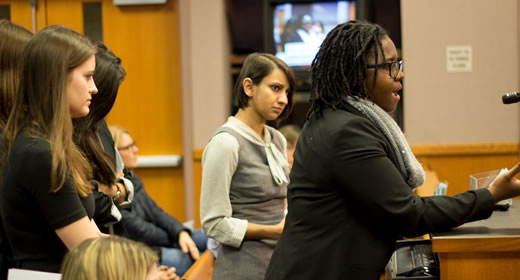
At the East Lansing City Council’s February 17 meeting, five first year Ford School masters students, winners of the inaugural Ford Case Competition, presented to the council their proposal to resolve the city’s downtown parking concerns. The city, home to Michigan State University, has experienced continued growth in its urban core, and city leaders seek to right-size the area's parking requirements.
Last fall, four teams of finalists presented their plans to a panel of city administrators and Ford School faculty. City Manager George Lahanas and other members of the panel selected the winning proposal, delivered by Catherine Derbes, Kamolika Das, Brenda Duverce, Maureen Higgins, and Khush Singh.
In her opening remarks to the city council this month, Derbes (MPP ’16) outlined that the team “wanted to ensure that any policy recommendations were aligned to community goals,” and laid out the goals for smart growth that they identified through their work: to increase downtown accessibility; promote an economically vibrant, walkable downtown area; build community support for strategic transportation policy; and minimize environmental impacts of automobile use.
The city’s parking code currently requires twice as much parking as Ann Arbor, contributing to what Singh and East Lansing Mayor Nathan Triplett (MPP ’09) have called an “ample supply” beyond what is needed. The team also pointed out that the current parking stock artificially limits development by occupying space that could otherwise be used in the construction of new businesses.
Higgins, who made a deeper dig into utilization, pointed out that, at peak times, surface lots and metered street spaces are at 100% capacity while structures were closer to 60% full. To address this, she proposed a 20% rate increase for surface lots and street parking, leaving structure rates unchanged – a fee schedule she predicts will achieve greater balance in available spaces. When asked by Mayor Pro Tem Diane Goddeeris for a more specific appraisal of “how high is too high,” Higgins emphasized the difficulties in assessing true demand elasticity in East Lansing, and maintained support for the modest increase, recommending re-assessment at the six month mark.
Mayor Triplett later Tweeted his appreciation to the winning team: “Thanks to the winning @fordschoolcase team for attending tonight's @CityofEL Council meeting to present parking policy recommendations.” He added, “As an alumnus of the @fordschool, it was a tremendous pleasure working with the very talented @fordschoolcase students.”
--By Nick Pfost (MPP '15)
You can watch the full presentation online and view photos on the Ford School Flickr page.
The Ford Case Competition (FCC), student-organized and run by the Ford Case Collective, is a 10-day consulting project in which teams of graduate public policy students compete against one another. Through the competition, students create implementable solutions to real-world policy problems facing a local government or nonprofit organization in Michigan. Funding for the competition was provided by the Center for Local, State, and Urban Policy, the Nonprofit and Public Management Center, the Student Affairs Committee, and the Office of the Dean.